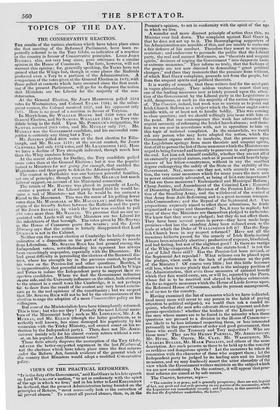VIEWS OF THE PRACTICAL REFORMERS.
"IT is the duty of the Government," said Earl GREY in his late speech on Lord WICKLOW'S motion, "to act in conformity with the spirit of the age in which we liver and in his letter to Lord EBRINGTON be declared, that the present Administration being founded on the principles of Reform, "must necessarily look to the correction of all proved abuses." To correct all proved abuses, then, is, in the premier's opinion, to act in conformity with the spirit of the age in which we live.
A.sounder and more discreet principle of action than this, no Minister ever laid down. The complaint against Earl GREY is, that he does not act up to it. The thoroughgoing supporters of his Administration are sensible of this, and are unable to make out a fair defence of his conduct. Therefore they resort to misrepre- sentation ; and endeavour to persuade the public that the Liberal party, the real and earliest Reformers, are " theorists and unquiet spirits," desirous of urging the Government " into desperate haste or extreme measures." They inform us truly, that the feelings of the people are not now directed to demanding " great political changes ;" and then they insinuate that the pressure from without, of which Earl GREY complains, proceeds not from the people, but from the unquiet spirits and political theorists.
It is worthy of remark, that these writers deal for the most part in vague phraseology. They seldom venture to assert that any one of the leading measures now orlately pressed upon the atten- tion of the Government by the Liberal party in the Legislature is wild, dangerous, or such as the majority of the nation disapprove of. The Courier, indeed, last week was so unwary as to point out Irish Church Reform as a subject which the Minister ought not to meddle with, or at least not to handle boldly. This was coming to close quarters; and we should willingly join issue with him on the point. But our contemporary this week has advocated the urgent necessity of reforming the Irish Church abuses; and there- fore we are now in accordance with, not in opposition to him on this topic of national complaint. In the meanwhile, we would ask any person who may have adopted the notion, which the Government organs strive to inculcate, that the pressure upon the Legislature springs from mere theorists and unquiet spirits, first of all to peruse the list of those measures which the Ministers are urged to bring forward and honestly to persevere in and prosecute to the end. Let him ask himself candidly, whether they are not all of an eminently practical nature, such as if passed would benefit large masses of his fellow-countrymen, without in any the smallest degree endangering the safety of the State or the stability of the Government. Nay, more—are they not, with scarcely an excep- tion, the very same measures which for many years the men now in power strenuously advocated, as being of first-rate importance? What are those measures ? Ecclesiastical and Municipal Reform ; Cheap Justice, and Amendment of the Criminal Law ; Removal of Dissenting Disabilities ; Revision of the Pension List; Reduc- tion of the Standing Army, and the withdrawal of the control of that Army from Anti-Reforming and in a great measure irrespon- sible Commanders; and the Repeal of the Septennial Act. Can propositions expressly aimed to effect these alterations, be fairly stigmatized as vague and theoretical? No, it may be replied; but most of these the Ministers are themselves pledged to undertake. We know that they were so pledged; but they do not effect them. They have been several years in power—they have made large promises—but has the standing Army been reduced even to the scale at which the Duke of WELLINGTON left it? Has the Eng- lish Church been in any respect reformed ? Have not all the measures hitherto passed for the remedy of Irish Ecclesiastical Abuses been miserably abortive ; productive of expense, bloodshed, and bad feeling, but not of the slightest good? Is there no vestige of the Whig-vituperated Six Acts on the statute-book? is not the Law of Libel there still? Has the Pension-list been revised, or the Septennial Act repealed? What reliance can be placed upon the pledges, when such is the lack of performance on the part of the Ministry ? Of course very little ; but this little becomes still less, when we see plainly that such is the unhappy position of the Administration, that even those measures of national benefit which they fain would carry, are, or will be, rejected by the Peers, whose fiat is to be received and obeyed in helpless submission. As far as regards measures which the House of Lords frowns upon, the Reformed House of Commons, under its present management, is of no use to the country.
Having examined the list of measures which we have indicated, (and many more will occur to any person in the habit of paying attention to political subjects), we would then ask a candid in- quirer, whether the men who advocate them are ignorant and dan- gerous speculatists ? whether the leaders of the Liberal party— the men whose names are to be found in the minority when these questions are pressed to a division in the House of Commons— are likely to be less informed respecting them, or less interested personally in the preservation of order and good government, than those who swell the Treasury and Tory majorities? Who arc those men? They are Sir HENRY PARNELL, Mr. ABERCROMBY. Mr. HUME, Mr. GROTE, Mr. CLAY, Mr. WARBURTON, Mr. CHARLES BULLER, Mr. MARK PHILLIPS, and others of the same description. Are such persons as these to be held up to the country as reckless and dangerous spirits ? Let the measures be taken in connexion with the character of those who support them ; let the Independent party be judged by its leading men and its leading measures, and we may fearlessly assert the utter absurdity of the view which the Government writers maintain on the subject which we are now considering. On the contrary, it will appear that prac- tical reforms are aimed at by safe means.
The Courier, however, says- " The country is at peace, and is generally prosperous ; there are not, in point of fact, any great and real evils pressing on any portion of the community, which the Legislature can innnediately remedy; and therefore, in this uncertain state, the less the Legislature undertakes, the better." So this is to be the grand result of the Reform Bill—this the fruit of the Revolution of 1832! Society has been convulsed and put in peril, in order to obtain an instrument of legislation, which is not to be used. The child has got its rattle—let it be thrown aside. The country is now told, that in point of fact, there are no "great or real evils" which legislation can remove ; that the men who struggled victoriously for Reform laboured under a gross de- lusion, when they supposed that any practical relief would arise from it ; that the country is peaceful and prosperous, and that the best course Parliament can adopt is to do nothing! This is the language of the Ministerial organ ; from which we learn, that the Whigs having succeeded in displacing their opponents, cannot see the necessity of any further changes. The Reform Act has worked well for them : its purpose has been accomplished; and all are satisfied, but a few "theorists and unquiet spirits," who press poor Lord GREY from without : therefore our Representatives may go to sleep. Till within the last fortnight or so, the Courier had been for several manths in the habit of insisting upon the neces- sity of continual and progressive reforms, in accordance with the spirit of the age. It was an advocate of the safe and rational Move- ment. Now, however, all is become happy and prosperous ; there is nothing to b3 done ; and therefore" the less the Legislature un- dertakes, the better !"—The prospect for the country Would indeed be gloomy, were these the real sentiments of the mended Cabinet. But, fortunately, the accession of Mr. ABERCROMBY, who was the msremost among those who lately pressed upon the Government the absolute necessity of adopting vigorous measures of Reform, gives reason to hope that a wiser policy will prevail. If Mr. ABER- CROMBY brings strength to the Ministry, as the Government jour- nals boast that he does, it is principally on this account : he is looked upon by the country as a pledge that large and enlightened measures are contemplated by the Government. It is precisely because he opposed the Do-as-little-as-possible system, that his certain and easy return for Edinburgh is expected.



















 Previous page
Previous page